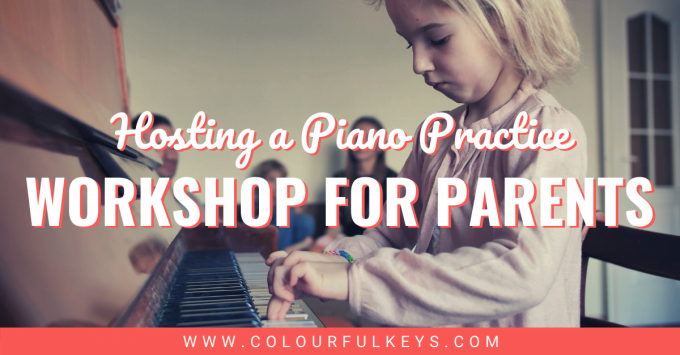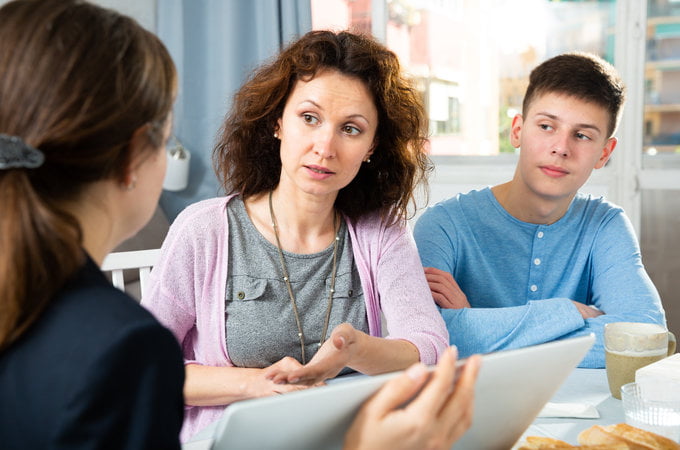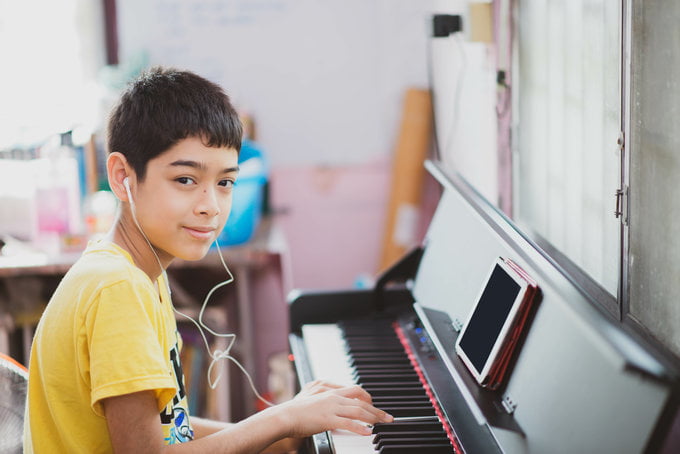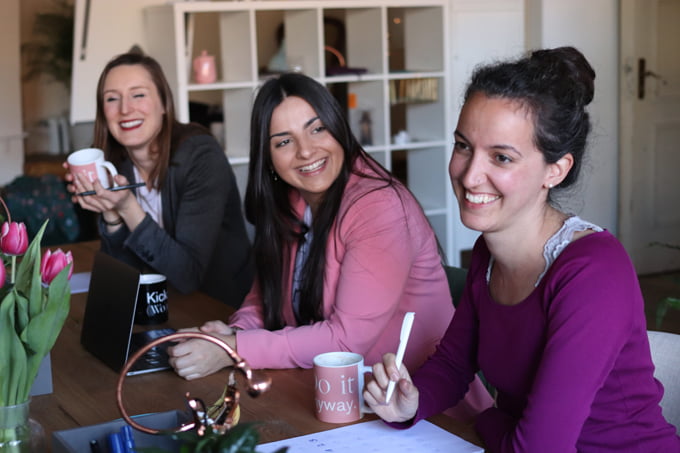I consider it our responsibility as teachers to make sure the parents who didn’t study music are just as capable of helping their kiddos as those who did. That’s why I’d been wanting to do a parent practice workshop for quite some time. I hosted my first one last September.

A parent practice workshop is a great way to connect with piano parents at the start of the school year and get them more involved in their children’s lessons. This, in turn, helps their kids be more successful in their studies.
The workshop I held went so well that it’s going to become an annual event in my studio. This year, I’ll be hosting the workshop over Zoom rather than in person. While I may need to schedule an extra session so that the groups of parents aren’t too big, the content will remain essentially the same.
Let me share with you how I ran this workshop so that you can do something similar for your piano parents.
Encouraging Parents to Attend
You’ll need to really sell your parents on attending. Even free things need to be marketed!
As with all marketing, you need to put yourself in their shoes when you’re explaining this new workshop. Don’t talk about yourself – be clear about what’s in it for them.
I used this wording in my email to parents:
The first special event this year is a brand new addition and something I’ve been wanting to add to the calendar for awhile: A workshop just for parents. I’m calling it “Playing, Practice & Pie” and it will be a great opportunity to get the piano year off to an amazing start!
At the event, I’ll share tips and ideas for how you can support practice and piano studies at home. This will be an open discussion and also a chance to meet (and possibly commiserate!) with other parents in the studio. And, yes, there will be treats 😋
I’ve planned for 2 events:
• Friday September 6th at 6pm
• Saturday September 7th at 3pm
If neither of these suit you, but you would really like to attend this session, then please let me know your availability. I may be able to host another depending on demand. Please RSVP as soon as you can so that I know how much pie I need. 🥧
This was just a brief message, but people knew what to expect and what the benefits would be. I followed up with the parents I saw in person, too, reiterating the benefits and saying I hoped they could come along.
(Yes, I shamelessly bribed them with treats. I don’t use food rewards in my studio but I have no problem using them on parents. 😉 )
What to Cover in Your Practice Workshop for Piano Parents
I wanted to cover 2 main areas in my workshop: (1) General studio philosophies and (2) Practice tips.
Studio Philosophies
Without getting too heavy-handed about it, I took a few minutes to fill in my piano parents on our studio philosophies and how we do things at Colourful Keys.
This is something that I would have already talked to parents about at our very first meeting together, but for some parents, that could have been years ago!

They see this in action all the time but I thought it was important to take this opportunity to reiterate how we do things and why this matters.
My piano parents shouldn’t just think my studio is fine. I want them to be excited to be part of a community that does things differently.
I want them to be fans, not just customers.
Why We Do Improvisation and Composition
The first area that I explained a bit more about was why we do all this “creative stuff” in the studio.
I gave parents a little surface-level background on how Beethoven, Mozart and the like learnt to improvise and read music, and how this got pushed out of what we consider to be traditional classical music today.
Not every piano parent needs an extensive knowledge of the history of music or piano pedagogy. I didn’t talk their ear off. I did want them to see, however, how the few minutes spent exploring the black keys or messing around with a scale is a part of the larger mission we’re on together.
These things matter because they’re part of making the world of music education more inclusive and accepting as a whole.
How We Teach Reading
On the flip-side, I also wanted to give them a quick run-down of how we teach reading skills. I think this is important to explain. Some parents have never studied music, while others learnt in a completely different way than how I’m teaching their children.
Having these conversations about the basics of intervallic reading and why we don’t use mnemonics is important. It can be hard to find the opportunity to do so, though. I used this workshop as the perfect time to quickly lay it out for them, and let them know that it was based on sound research and modern best practices.
Quick side note: When I mentioned mnemonics, I saw a few eyes widen from parents who I know have taught these at home. This is the perfect environment to address this. I wasn’t singling anyone out, but I was still getting the message across that mnemonics are not helpful. If you’ve had this issue with parents in your studio, that’s one more reason to consider a parent workshop!
The Piano Parent Practice Guidebook
We spent the rest of the session talking about how parents could help with piano practice at home.
I loosely followed the Piano Parent Practice Guidebook, discussing each area and taking questions from parents as we went through the topics.
Let me be clear that I didn’t read verbatim from the guidebook. That would have been very dry and wouldn’t encourage interaction. It was just there to provide a rough structure for our chat and given to them as reinforcement and further reading.
Vibrant Music Teaching members can find the Piano Parent Practice Guidebook in the VMT library.
Not a member? Join today and get instant access to the Piano Parent Practice Guidebook plus loads of other amazing resources.
Practice Routine
First we talked about practice routines. I shared some suggestions about establishing a routine based on the other things going on in the family’s schedule. Then I opened it up for parents to share what’s worked well and what struggles they’re having in this area.
It was great to hear different parents’ perspectives here. They definitely got more from each other than from me – which is exactly what I wanted. 😃

Some parents shared how they’ve split the piano practice in half or done it before school while the rest of the family has breakfast. (Some kids are just naturally early risers. If they’re up before everyone else anyway, they might as well use the time!)
I could see the wheels turning for many parents as they listened to what others had tried and found successful. Win.
Practice Environment
I spoke briefly about the practice environment including:
- Benches and bench height
- Footstools
- Not adjusting volume on digital pianos
- Making sure it’s a welcoming area
- Minimising distractions from other family members who want to watch TV or use a computer in that area
This stuff really matters. I shared with parents how reluctant I used to be to practise myself when my brothers were watching TV in the next room.
Many students won’t articulate these kinds of issues. Once you identify them, though, they can be easily solved. So we did a little brainstorming for those that needed it to improve the practice environment at home.
Practice Time
This was another moment like the mnemonics one above. 😉
A workshop environment like this meant that I could explain why I’m against practice timers in general without singling out a parent who I know (with the best of intentions!) thinks in this way or uses a timer for their child’s practice.
We also spoke about general guidelines for how long practice might take at different stages of study and how I was open to them coming to me if they ever felt there were too many or too few assignments.
Practice vs Playing
The next thing I wanted to educate the piano parents about was the difference between practice and playing. Both of these are valuable, but they are utterly different modes of spending time at the piano.

Practice is messy. It includes stops and starts, bits played over and over, talking to yourself, singing, clapping, dancing, and any manner of other things we do to engage the brain and create new neural pathways that we need to play the piano.
Playing is about enjoyment. When we’re playing for ourselves or for others we can get lost in the flow. We don’t stop to fix mistakes or judge the results.
I want my students to do both regularly, and the parents can help make that happen.
When a kiddo is supposed to be practising and it sounds like they’re playing instead, a parent can ask a few questions to guide them back into focus-mode:
- What did your teacher want you to work on in that piece? Can you remember what you did in the lesson?
- You play that first bit beautifully! It sounds like it gets trickier around the middle though. How about working on that part on its own?
Parents can also suggest practice strategies for the student to try, so I demonstrated each of the most common strategies used in our studio and showed them where they could find the instructions in their child’s folder. This also gave me a chance to show them what this messy practice should look and sound like.
In this section, we also spoke about the importance of making time for their child to go into playing mode too, just noodling around on the piano or playing pieces they already know well and love.
Some kiddos find it helpful to do this as a warmup. Some like to save it for the end of practice. It’s all about finding what works for their child, which is why it’s good to have all the options spelt out.
Practice Struggles
Finally, we looked at practice struggles and what to do when things get hard.
Piano studies are not always rosy, even for the most motivated students. It’s important that parents know that’s normal, and that we’re here when they hit the rocky patches.
I spoke briefly about grit and the work of Angela Duckworth and how beneficial learning an instrument can be for their child.
After that, I explained the idea of praising based on effort rather than intelligence or talent, and the work of Carol Dweck on “growth mindset”. I was careful not to get too preachy about how they parent their children, but I did explain the type of language I use at the studio and how this can be reflected at home. I also shared some resources in case they were interested in exploring this further.
Have you done a parent practice workshop?
Do you have other tips for piano parents? I’d love to hear your experience and what you included! Please leave a comment below so we can collaborate and make the future of music education better for everyone.
And for more tips on working with your studio’s piano parents, check out the ‘Parents’ section of my Piano Studio Business page.
I’ve been wanting to do this for so long too!